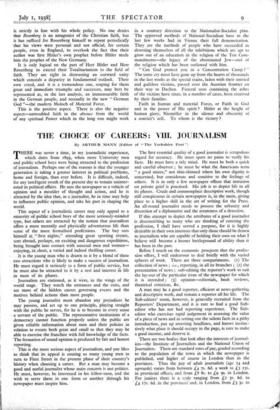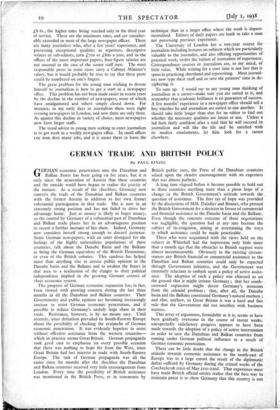THE CHOICE OF CAREERS : VIII. JOURNALISM
By ARTHUR MANN (Editor of " The Yorkshire Post")
THERE was never a time, in my journalistic experience, which . dates from 1893, when more University men and public school boys were being attracted to the profession of journalism. Perhaps one of the reasons is that the younger generation is taking a greater interest in political problems, home and foreign, than ever before. It is difficult, indeed, for any intelligent youth of the present day to remain uninter- ested in political affairs. He sees the newspaper as a vehicle of opinion and a moulder of thought and action, and he is • dttracted by the idea that, as a journalist, he in time may help to influence public opinion, and take his part in shaping the world.
This aspect of a journalistic career may only appeal- to a minority of public school boys of the more seriously-minded type, „but others are attracted by the notion that journalism' offers -.a more mentally and physically adventurous life than some of the more formalised professions. The boy sees himself alt first nights," attending great sporting events, sent abroad, perhaps, on exciting and dangerous expeditions, being brought into contact with unusual men and. women- enjoying,,-in ;short, a varied and indeed thrilling career.
It is the young man who is drawn to it by a blend of these . two attractions who is likely to make a success of journalism. ,:He must Tegard it seriously as a form of public service, but he must also ."be attracted to it by a zest and interest in life in most of • its phases. • Journalists are stationed, as it were, in the wings of the world stage. They watch the entrances and the exits, and see more -Of the hidden causes governing events and the motives behind actions than most people.
The young journalist must abandon any prejudices he - may possess, and act up to one principle, playing straight with the public he serves, for he is to become in every sense a servant of the .public. The representative institutions of a democracy cannot function properly unless the public are given reliable information about men and their policies in relation to events both great and small so that they may be able to exercise the franchise with full knowledge of the facts. The formation of sound opinion is produced by fair and honest reporting.
This is the more serious aspect of journalism, and one likes to think -that its appeal is causing so many young men- to turn to Fleet Street in the present phase of their country's history when choosing a career. But a man may become a good and useful journalist Whose main concern is not politics. He must, however, be interested in his fellow.lnen, and the wish to serve them in one form or another 'thiough his newspaper Must inspire him. The first essential quality of a good journalist is scrupulous regard for accuracy. He must spare no pains to verify his facts. He must have a tidy mind. He must be both a quick and careful observer ; he must be what the Americans term " a good mixer," not thin-skinned where his own dignity is concerned, but considerate and sensitive to the feelings of others. It is in only a few newspaper offices that intrusion on private grief is practised. His job is to depict life in all its phases. Crude and commonplace descriptive work, though still conspicuous in certain newspapers is, in the main, giving place to a higher skill in the art of writing for the Press. An all-round journalist needs to possess the urbanity and discretion of a diplomatist and the astuteness of a detective.
If this attempt to depict the attributes of a good journalist is disconcerting to many who are thinking of entering the profession, -I shall have served a purpose, for it is highly desirable in their own interests that only those should be 'drawn to journalism who are capable. of holding their own on what I believe will become a keener battleground of ability than it has been in the past.
Before I touch on the economic prospects that the profes- sion offers, I will endeavour to deal briefly with the varied spheres of work. There are three compartments. (t) The collection of news ; i.e., reporting, in all its branches ; (2) the presentation of news ; sub-editing the reporter's work to suit the lay-out of the particular issue of the newspaper for which it is intended ; (3) opinion—editoriali, book reviews, theatrical criticism, &c.
A man may he a good reporter, efficient at news-gathering and descriptive work, and remain a reporter all his life. The Sub-editors' room, however, is generally recruited from the Reporters' Department, and it is rare to find a good Sub- editor who has not had reporting experience. The Sub- editor who exercises rapid judgement in assessing the value of a piece of news and in setting out the salient facts in a pithy introduction, put up arresting headlines, and knows instinc- tively what place it should occupy in the page, is sure to make a good income, and deserve it.
There are two bodies.that look after the interests of journal- ists—the Institute of Journalists and the National Union of Journalists. There are standard rates of pay, graded according to the population of the town in which the newspaper is published, and higher of course in London than in the provinces. Thus the pay of adult journalists (age 24 and upwards) varies from between £4 7s. 6d. a week to £5 15s. in provincial offices, and from £8 8s. to £9 9s. in London. For juniors there is a scale ranging from £2 3s. 6d. to , 6d. in the provinces 'and, in London, from £3 3s. to £6 6s., the higher rates being reached only in the third year of service. These are the minimum rates, and are consider- ably exceeded in most of the large newspaper offices. There are many journalists who, after a few years' experience, and possessing exceptional qualities as reporters, descriptive writers or sub-editors, earn L700 or ifloo a year, and in the offices of the more important papers, four-figure salaries are not unusual in the case of the senior staff men. The most responsible posts in some cases carry a Cabinet Minister's salary, but it would probably be true to say that these posts could be numbered on one's fingers.
The great problem for the young man wishing to devote himself to journalism is how to get a start in a newspaper office. This problem has not been made easier in recent years by the decline in the number of newspapers, some of which have amalgamated and others simply closed down. For instance, in my early days in journalism there were eight evening newspapers in London, and now there are only three. As against this decline in variety of choice, most newspapers now have larger staffs.
The usual advice to young men seeking to enter journalism is to get work in a weekly newspaper office. In small offices cne man does many jobs, and it is easier there to learn the technique than in a larger office where the work is depart.- mentalised. Editors of daily papers are loath to take a man not possessing previous experience. The University of London has a two-year course for journalists including lectures on subjects which are particularly valuable to the journalist, and also offering opportunities of practical work, under the tuition of journalists of experience. Correspondence courses in journalism are; to my mind, of little value. While waiting for a start time is not lost that is spent in practising shorthand and typewriting. Most journal- ists now type their stuff and so save the printers' time in de- ciphering it. To sum up. I would say to any young man thinking of journalism as a career—make sure you are suited to it, and remember that academic brilliance is no guarantee of success. A few months' experience in a newspaper office should tell a boy whether he and journalism are suited to one another. It should take little longer than that for an editor to find out whether the necessary qualities are latent or not. Unless a lad feels fairly confident after a trial that he will succeed in journalism and will like the life and be satisfied with its modest emoluments, let him look for a career elsewhere.



















































 Previous page
Previous page